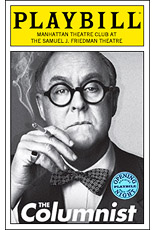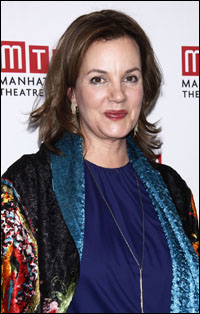
*
The lesson learned from David Auburn's caustic and cautionary tale of political columnist Joseph Alsop, The Columnist, which premiered April 25 at the Friedman, is that people who live in glass houses don't rattle sabers in public.
One of the most controversial pundits in print in the mid-20th century, he was the strident hawk leading the battle charge into Vietnam, and he sustained that longer than readers, and reason, allowed. On the homefront, he was a man divided in an equally divided home. A closet homosexual, he married the perfect hostess for his Georgetown soirees because she agreed to settle for less — 'til she couldn't. Even the brother he shared his trouble-courting column with, Stewart, eventually fled to the tamer fields of the Saturday Evening Post ("The Norman Rockwell Weekly," as Joe derisively sneered). In the end, he is left with the typewriter he clung to for dear life.
Auburn couldn't call this play anything else. "For Joe, that was the central facet of his identity," the playwright pointed out. "He was a person whose job was to tell other people what to think about things. He was a man who was all about opinion and expressing his opinions as forcefully and disseminating them as widely as he could. It was so central to his identity I thought that would be a good title."
Only by chance did Auburn stumble across Alsop's story. "I was reading about the Vietnam era, and his name popped up in a lot of places. It was clear that this was a very influential, powerful man in his day who is now almost completely forgotten. So, I guess, part of the play came out of 'How does that happen? How do you go from being in this position of power and influence to being obscure?' Finding out about that led me to writing the play." Research was a piece of cake. "There's a lot of material on Joe Alsop. There are biographies of him. There are biographies of his brother. Everyone wrote their own memoirs, and he's mentioned in a lot of Washington Insider-y histories." Both acts begin and end with Alsop banging away at the typewriter keys until, finally, there is silence. "He runs out of words," said Auburn. "Suddenly, he realizes he has nothing left to say. I wanted to leave him with that. He's drained. In that moment, there's the realization that he's lost — that the thing that made him who he was is no longer available to him and slipping away. I wanted you to feel the loss of these people from his life. I just wanted to jump forward in time so you felt the absence of Stewart, the absence of Susan Mary — that you were with him in recognizing that he needed them, that he lost the counterbalance they provided."
It could be his height or his heft, but John Lithgow leaves one with a profound loneliness unequalled since Charles Foster Kane in His Later Years. This is Lithgow's third stage journalist in a row (following his Tony-winning Sweet Smell of Success and the giddy, gossipy Mr. & Mrs. Fitch) — and his first factual one. He pulls out all the stops and goes after the character with a blistering bravado.
[flipbook] On opening night, unlike other nights, after Lithgow took his single call and motioned for his supporting cast to join him back on stage for a final bow, they refused to budge from the wings, leaving him all alone center stage with an increasingly desperate smile on his face. Throwing his arms wide open like Al Jolson singing "Mammy," he lowered himself gradually as the curtain fell.
The opening-night party was held a happy hop-skip-and-jump across the street from the theatre at Copacabana, a convenience that overrode any press complaints about this being the third opening-night party to be held there this week. As usual, the press line was set up on the second landing, and after the interviews the cast moved a flight up to party more with friends, fellow actors and Manhattan Theatre Club patrons.
The scandal that shook Alsop's career to its roots — his one-night-stand in 1954 with a young Soviet male in Moscow, replete with a series of explicit photographs that were wildly distributed courtesy of the KGB — provides the framing for Auburn's play. Alsop's frontal way of dealing with this situation and defusing the threat of blackmail is as close as the columnist ever came to profiles in courage.
"He was a courageous man, and he was sort of a sad hero," Lithgow allowed. "There's a lot I dislike about the character. I was against the Vietnam War, and he was all for it. He was an interesting man in the fact that he was an FDR liberal and so were my parents in their generation. He considered himself JFK's kingmaker. He was full of contradictions. He had a very conservative side and a very compassionate and liberal side. The interaction of those qualities is what makes him so fascinating — and he would shift gears extremely fast. The whole fun of the play is how quickly he will change — from anger to kindness or anger to hurt."
Again, research was no problem. "I read a lot of Alsop's columns. I read a fabulous biography by Robert Marin about Joe and Stewart, which really told the story. And I saw some video of him. We found video. We found audio. He was such an extraordinary character. His manners and affectations were so extreme that I had to do a sort of moderated version of it. Otherwise, I would have been too over-the-top."

Buy this Limited Collector's Edition |
Alsop opposition is, likewise, thoroughly documented — namely, The New York Times' David Halberstam. "There's so much source material you can find that you had to cherry-pick which things were going to help you with the delivering of the role and the text," admitted his impersonator, Stephen Kunken.
"I never knew until I started working on this that his book, 'The Best and the Brightest,' was ironically titled. The brightest and the best were these guys who got us into this war. They were the smartest, and they made a huge mistake."
Brian J. Smith, who displayed washboard abs in Roundabout's Come Back, Little Sheba revival, arrives shirtless as the sexy Russkie in The Columnist. "It's in my contract these days," he kidded. "I had to do a lot of hardcore stuff for other roles I've played, but for this one I just do a lot of yoga and running." The accent also came easily to him: "I worked in Bulgaria for a month on a TV movie so I had that sound in my head."
Grace Gummer brought such a breezy assurance to the role of Alsop's stepdaughter one would not suspect — save for the bandage in her barefoot scene — that she suffered a painful sprain in a subway fall and missed a performance on Friday. "It was bad. I couldn't walk, but it's getting better. I'm having such a good time, except for that. I can't wait to keep doing it and doing it. I love it. I love how I get to age from 14 to 16 to 18 to 20 and how I can play John's stepdaughter. I think that's just the best part of my job. I look forward to it every day. He's so inspiring. My mother [Meryl Streep] did her first play with him, Trelawny of the 'Wells,' back in the day."
 |
||
| Margaret Colin |
||
| Photo by Joseph Marzullo/WENN |
"If you get to play a woman who asks for what she wants and is vulnerable to ask for what she wants, then you're lucky. David gave us a really great skeleton of a wonderful play, and this company — through the amazing Dan Sullivan — is adding nuance and texture and passion and conflict to it."
So what was director Sullivan's reaction to Auburn's play on first reading? "A part of it is that we respond to a thing politically if we are in any way political so I had very much a political response to it," replied the man who was in the original cast of Hair when Alsop was at the height of his powers. "Being a progressive myself, I saw it as the making of a neo-con. We know so many brilliant journalists who through Vietnam or Israel — through whatever single issue one gets ahold of and can't let go of — become suddenly stuck in a reactionary mode. To me, it was that story writ large in that man who had even more power than any of the journalists we know today."
Sullivan sees the ensemble foundation in Lithgow's tour de force. "John, like any great actor, feeds off the other actors, and he has such extraordinary respect for all of them and knows they are what's floating him and making that such a great performance." Another example: "John was a good friend of Halberstam's, and he enjoyed Stephen so much he abstained from talking about how Halberstam was to him. He was very much respectful of the fact Stephen was creating his own guy."
The director has already started his next project — beginning, on Shakespeare's birthday this week, As You Like It with Lily Rabe as Rosalind, David Furr as Orlando and Andre Braugher as The Duke for the Delacorte.
John Lee Beatty, who did the inventive sets for The Columnist, will follow Sullivan into the park for As You Like It, and will linger for Into the Woods.
So how do you design Into the Woods for a theatre that's already into the woods (of Central Park)? "Piggybacking on the top of As You Like It — which also has some very famous woods: the forest of Arden — it's a natural fit that we do the two of them. But there are some surprises in both of them."
Less natural was his first response to The Columnist: "I must say when I read the script, and we're jumping from Moscow to Georgetown to Vietnam — I tried not to freak out. It was rather a challenge. Also, Dan Sullivan wanted it to get bigger toward the end with more air, so it was not only figuring out the skins of the onion but how at the end to surprise you with a lot of open space, which is even harder. I don't know how I did it."




























































